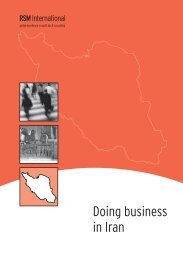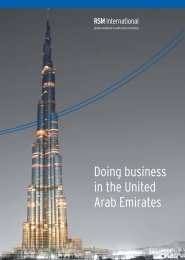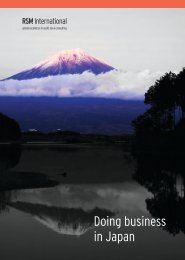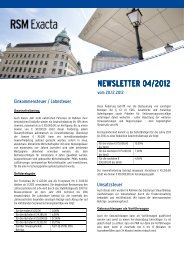Doing Business in India - RSM Austria
Doing Business in India - RSM Austria
Doing Business in India - RSM Austria
Create successful ePaper yourself
Turn your PDF publications into a flip-book with our unique Google optimized e-Paper software.
CHAPTER 5<br />
FOREIGN INVESTMENT IN INDIA<br />
1.0 INTRODUCTION<br />
1.1 The liberalization process started <strong>in</strong> <strong>India</strong> <strong>in</strong> 1991 and second-generation reform<br />
st<br />
started <strong>in</strong> the first decade of 21 century has virtually opened out <strong>India</strong>n economy<br />
for foreign <strong>in</strong>vestment <strong>in</strong> all the sectors, barr<strong>in</strong>g few sensitive sectors. The<br />
liberalization process has thrown open opportunities for <strong>in</strong>bound <strong>in</strong>vestment<br />
(foreign companies <strong>in</strong>vest<strong>in</strong>g <strong>in</strong> <strong>India</strong>) as well as outbound <strong>in</strong>vestment (<strong>India</strong>n<br />
companies <strong>in</strong>vest<strong>in</strong>g out of <strong>India</strong>) <strong>in</strong> almost every field of bus<strong>in</strong>ess from the<br />
consumer durables sector to core <strong>in</strong>frastructure sector. The World Bank has<br />
appreciated the <strong>India</strong>n liberalization reforms <strong>in</strong> one of its Annual Report stat<strong>in</strong>g<br />
“<strong>India</strong> is mov<strong>in</strong>g rapidly towards closer <strong>in</strong>tegration with the global economy and the<br />
reform process, which has been brought about <strong>in</strong> such a short time, represents an<br />
irreversible movement towards a vibrant economy.” In this process of liberalization,<br />
<strong>India</strong> has taken various measures like de-licens<strong>in</strong>g, permitt<strong>in</strong>g foreign <strong>in</strong>stitutions to<br />
<strong>in</strong>vest <strong>in</strong> shares and securities under portfolio <strong>in</strong>vestment, current account<br />
convertibility, liberaliz<strong>in</strong>g exchange control regulations, drastically reduc<strong>in</strong>g the<br />
rates of customs duty and direct taxes, permitt<strong>in</strong>g <strong>India</strong>n companies to list on<br />
foreign stock exchanges and set up overseas operations, permitt<strong>in</strong>g resident<br />
<strong>India</strong>ns to buy shares and securities listed abroad etc.<br />
1.2 Accord<strong>in</strong>gly, Foreign Investment <strong>in</strong> <strong>India</strong> is still regulated among other legislations,<br />
by the Exchange Control Regulations although under new regulations, the focus has<br />
been shifted on manag<strong>in</strong>g foreign exchange <strong>in</strong>stead of regulat<strong>in</strong>g the same. In this<br />
note, we have restricted our discussion on Foreign Investments <strong>in</strong> <strong>India</strong>.<br />
2.0 EXCHANGE CONTROL REGULATIONS – FOREIGN<br />
INVESTMENTS<br />
2.1 Introduction<br />
In <strong>India</strong>, till 31 May 2000, exchange control transactions were regulated by Foreign<br />
Exchange Regulation Act, 1973 (‘FERA’). FERA has been repealed by the Foreign<br />
Exchange Management Act, 1999 (‘FEMA’), which has come <strong>in</strong>to force with effect<br />
from 1 June 2000. The provisions under FEMA are liberal compared to provisions<br />
under FERA. The analysis of FEMA provisions conta<strong>in</strong>ed here<strong>in</strong> is updated as on 30<br />
April 2010.<br />
58<br />
DOING BUSINESS IN INDIA














